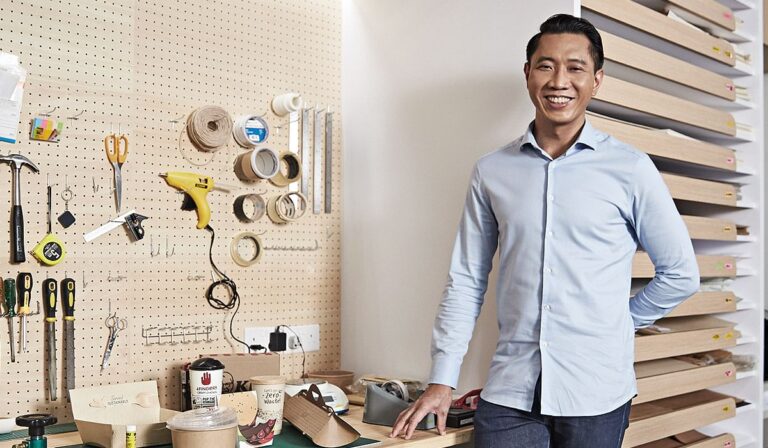
Fertiliser made from food waste and single-use packaging? Sustainable packaging firm TRIA and KFC Singapore have launched the world’s first closed-loop single-use packaging solution through a pilot programme. Their initiative aims to catalyse circularity in the F&B industry.
TRIA is helmed by CEO Ng Pei Kang, who spent more than a decade as an innovation designer before making the switch to sustainability. While exploring “more meaningful” career options, he deep-dived into Singapore’s waste problem. Eventually, he turned to sustainable food packaging.
As the home page of TRIA’s website reminds us, 12 million tonnes of food waste are thrown away every year and end up in landfills. On average, a person living in the city generates 150kg of food waste. The same person is likely responsible for 30kg of disposable packaging waste.
“Sustainability is a big problem to solve — and probably one of the most challenging for our generation. To achieve sustainability, we must take ownership and responsibility,” Ng, 41, points out. “Singapore is a small country, but big on consumption with a ferocious appetite. So it will be amazing if we could do the same in aftercare.”
Closing the food waste loop

To empower F&B businesses to close the loop, he developed a farm-to-table solution that turns single-use food packaging and food waste into fertiliser. Patented technologies allow TRIA’s bio-based material NEUTRIA to be digested into fertiliser and biogas for green energy. Additionally, with its collect-back system of the food waste, TRIA even takes producer responsibility by closing the waste loop.
TRIA opened its new digestion facility in June to serve this purpose. Measuring 3,000 sq ft, it cost more than $3 million to build, and processes 30,000kg of packaging and food waste daily.
Besides contributing to the Singapore Green Plan 2030, its annual output of 850 tonnes of fertiliser will also benefit farmers and improve our nation’s food security. The plant can also produce 2,500MW of green energy — enough to power several HDB blocks for a year.
As a result of its products, TRIA has earned accolades such as the Emerging Enterprise Award, ASEAN-Korea Excellent Design and Singapore Packaging Star Awards. These products are not only designed for sustainability, but also to ease clients’ transition to a greener future by identifying and solving pain points.
Related: Spinning food waste into gold
A win-win-win outcome for consumers, businesses, and the environment

Taking ownership is the key to Ng’s success. “Sustainability is not an isolated problem. It is something that must be conveyed and changed. Taking ownership of waste is an important part of the process,” he says.
His actions match his words. “By taking responsibility for the closed-loop process with our cradle-to-table model — from packaging supply and waste collection, to digestion, and finally conversion into fertiliser — we want to encourage other product manufacturers to adopt this circular concept of return and recycle.”
“We want to show that circularity can be a positive-sum game,” Ng says, “where it is a win-win-win outcome for consumers, businesses, and the environment.”
Hopes are high for TRIA’s partnership with KFC. When the pilot programme with the fast-food giant’s Northpoint City outlet, which began in June, ends after six months, it will evaluate how to scale the solution across all of its 80 outlets in Singapore.
“Together, we can effect change and make a positive impact on the world,” says Ng, whose goal is to inspire others to tackle sustainability challenges beyond their usual boundaries with this project.
Towards the end of our conversation, we ask him to describe his entrepreneurial style. “When a problem arises, I prefer to ask what we can do to solve it instead of dwelling on it. I’m still learning as an entrepreneur and I’m glad for that. It’s important to stay humble so ideas can continue to find their way in.”
Related: Zero waste rum cocktails to sip on from 13 bars in Singapore
